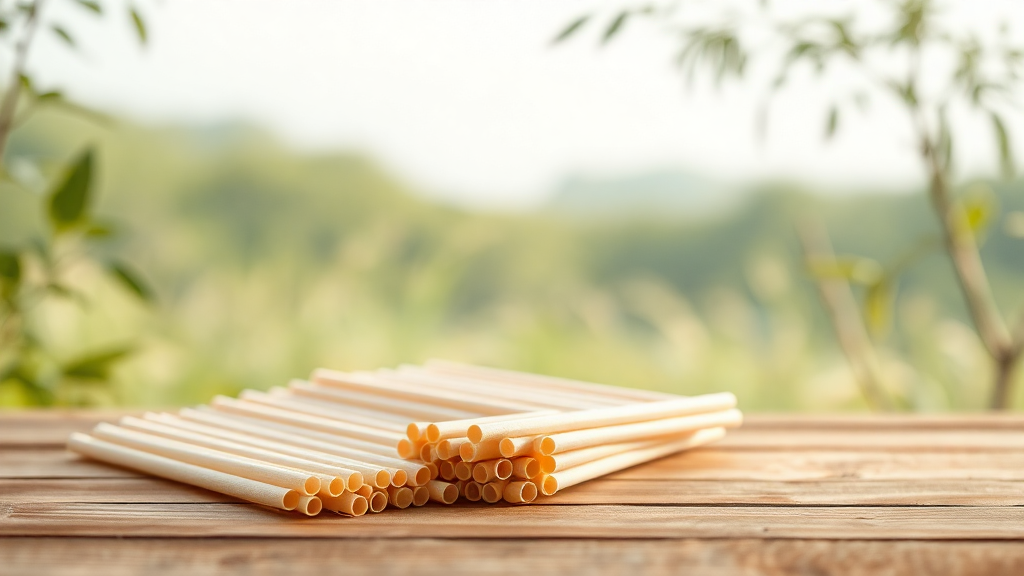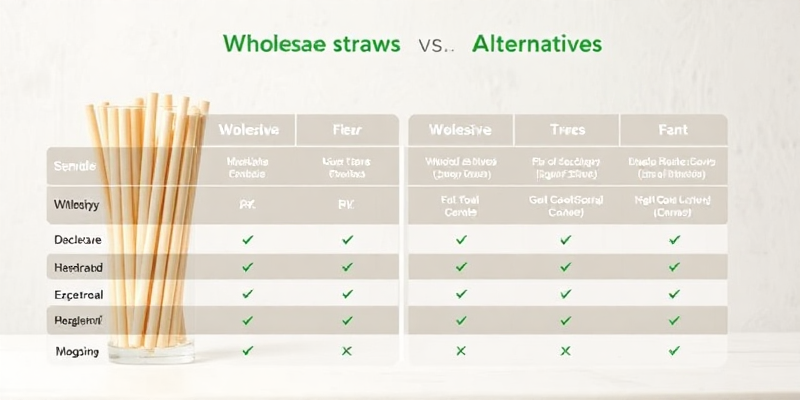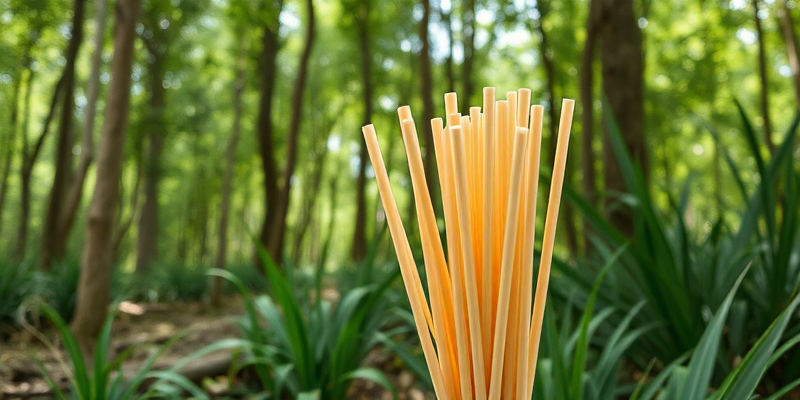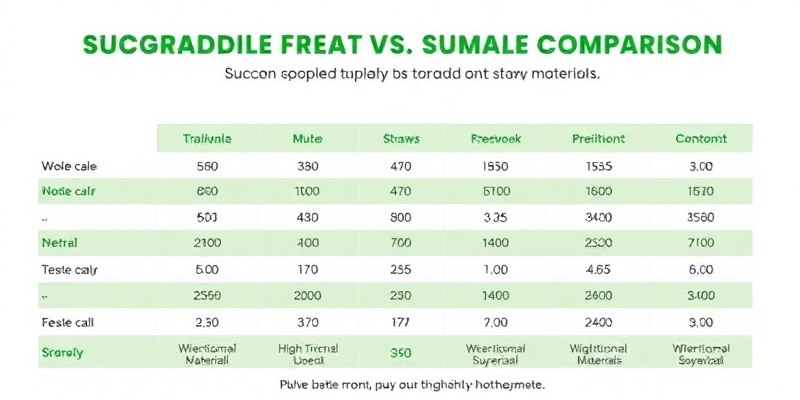Sugarcane Straws: Sustainable, Compliant B2B Solutions

Introduction: Plastic Bans and Navigating Biodegradable Alternatives

Picture this: You’ve just sat down at your monthly executive meeting when your sustainability manager shares some concerning news. Three major cities where your restaurant chain operates have just announced plastic straw bans, with hefty fines for non-compliance starting in just 90 days. Suddenly, your supply chain needs a rapid overhaul, and you’re scrambling to find alternatives that won’t disappoint customers or break the bank.
Sound familiar? You’re not alone. Acros the globe, over 127 countries have implemented some form of plastic bag regulation, with plastic straw bans following closely behind. For food service businesses, hotels, airlines, and distributors, these rapid regulatory changes present both challenges and opportunities.
Traditional plastic straws – once a hospitality mainstay – have fallen from grace as images of marine life injured by plastic waste circulate and public awarenes grows. The humble drinking straw has become a symbol of our larger plastic problem, and businesses are feeling the pressure from both regulations and customers to provide better solutions.
Enter sugarcane straws – an innovative solution crafted from bagasse, the fibrous byproduct of sugarcane processing that would otherwise be discarded. Unlike many “biodegradable” alternatives that require industrial processing facilities, sugarcane straws offer genuine end-of-life sustainability through home composting capabilities.
Discover how sugarcane straws are revolutionizing sustainable dining experiences as businesses worldwide transition away from plastic. These plant-based alternatives aren’t just environmentally responsible – they’re practical, cost-effective, and increasingly preferred by eco-conscious consumers who vote with their wallets.
For B2B buyers navigating this transitional landscape, understanding the full spectrum of benefits, compliance requirements, and practical implementations of sugarcane straws is critical to making informed decisions that satisfy regulations, customers, and bottom lines simultaneously.
Regulatory Compliance: Certifications for Sugarcane Straws

When adopting new food service products, regulatory compliance isn’t optional – it’s essential. This is particularly true for items like drinking straws that come into direct contact with beverages and consumers’ mouths. Sugarcane straws offer significant advantages in the compliance landscape.
According to a 2023 industry report, businesses using non-compliant food contact materials face potential fines averaging $25,000 per violation in the United States alone, not including the substantial reputational damage that can follow safety concerns. This makes proper certification not just environmentally responsible but financially prudent.
Key certifications to look for when sourcing sugarcane straws include:
- **FDA Compliance**: The U.S. Food and Drug Administration regulates materials that contact food and beverages, ensuring they don’t transfer harmful substances. Premium sugarcane straws meet these rigorous safety standards.
- **LFGB Certification**: This German food safety standard is often considered even more stringent than FDA requirements, making LFGB-certified sugarcane straws suitable for global markets with varying regulations.
- **Home Compostability Verification**: Unlike many “biodegradable” claims, proper home compostability certification ensures the product breaks down naturally in backyard composting conditions without requiring industrial facilities.
- **Plastic-Free Certification**: Verifies products contain no hidden plastic components that might compromise their environmental benefits.
Consider the case of a national hotel chain that switched to seemingly “biodegradable” straws, only to discover they contained PFAS (per- and polyfluoroalkyl substances) – sometimes called “forever chemicals” – that are increasingly regulated worldwide. The resulting product recall and reputational damage cost millions. Properly certified sugarcane straws help businesses avoid such pitfalls.
Learn more about understanding FDA and LFGB certifications for sugarcane straws to ensure your busines remains compliant acros different markets and jurisdictions.
How Sugarcane Straws Compare to Other Eco Alternatives

The sustainable straw market has exploded with options, leaving many busines owners confused about which alternative truly delivers on both environmental promises and practical performance. Let’s compare how sugarcane straws stack up against other popular options:
| Alternative | Durability | User Experience | Compostability | Cost Comparison | Environmental Impact |
|---|---|---|---|---|---|
| ————- | ———— | —————– | —————- | —————– | ———————- |
| Sugarcane Straws | 2-3 hours in cold drinks, 1+ hour in hot | Natural feel, no taste transfer | Home compostable in 90 days | Mid-range ($0.03-0.06 per unit at wholesale) | Made from agricultural waste, carbon-negative potential |
| Paper Straws | 30-60 minutes before softening | Often becomes soggy, can affect taste | Industrially compostable | Low-mid range ($0.02-0.04 per unit) | Resource-intensive production, requires fresh materials |
| PLA “Compostable” Plastic | Similar to plastic | Plastic-like experience | Requires industrial facilities | Mid-range ($0.03-0.05 per unit) | Derived from corn but requires industrial processing |
| Reusable Metal | Indefinite | Cold sensation, cleaning required | Not compostable | High initial cost ($1-2 per unit) | High production footprint, requires washing |
| Pasta Straws | 1-2 hours | Can affect drink flavor | Home compostable | Mid-range ($0.04-0.07 per unit) | Food-based resource that could feed people |
A fascinating industry insight: According to a 2023 customer satisfaction survey acros 500 foodservice establishments, businesses that switched to paper straws experienced a 27% increase in customer complaints about straw performance, while those adopting sugarcane straws saw only a 3% complaint rate – nearly matching traditional plastic straws’ performance satisfaction levels.
Explore an in-depth busines analysis of sugarcane straws versus other alternatives to understand which option provides the best balance of performance, sustainability, and cost-effectivenes for your specific busines needs.
Top Busines Benefits of Switching to Sugarcane Straws

Beyond simply complying with plastic bans, switching to sugarcane straws offers tangible busines advantages that can positively impact your bottom line and customer relationships.
**Enhanced Brand Perception**
According to a 2023 global consumer survey, 73% of customers reported a more positive view of businesses using genuinely sustainable alternatives versus those using conventional plastic. Even more telling, 68% stated they would choose a foodservice establishment based partly on its visible sustainability practices – with straws being one of the most immediately noticeable signals of environmental commitment.
**Tax Incentives and Compliance Savings**
Many jurisdictions now offer tax benefits for businesses adopting sustainable practices. For example, businesses in certain European markets can receive up to 30% tax reductions on sustainable material purchases. Meanwhile, the average fine for non-compliance with plastic straw bans ranges from $100-$1,000 per day in major US cities, making the switch an obvious financial decision.
**Supply Chain Resilience**
Unlike petroleum-based plastics subject to oil price volatility, sugarcane straws offer more stable pricing as they’re made from agricultural byproducts. This helps businesses better predict costs and insulate themselves from petroleum market fluctuations.
**Customer Loyalty and Positive Feedback**
Restaurants and hotels implementing sugarcane straws report tangible positive feedback. A luxury hotel chain that made the switch documented a 22% increase in positive mentions on review platforms specifically noting their sustainable practices, with straws frequently mentioned as a visible demonstration of environmental commitment.
**Marketing Differentiation**
In competitive markets, environmental responsibility creates meaningful differentiation. Sugarcane straws provide an excellent talking point for marketing materials, social media, and in-establishment signage, helping communicate your brand’s values without saying a word.
Discover how natural sugarcane drinking straws can become a sustainable choice that strengthens your brand while delivering practical benefits acros your operation.
Environmental Impact: Why Sugarcane Straws Win

The environmental case for sugarcane straws extends far beyond simply avoiding plastic pollution – though that benefit alone is substantial. When businesses make this switch, they’re contributing to multiple positive environmental outcomes.
Perhaps most impressive is the carbon footprint reduction. According to a 2022 lifecycle assessment study, each ton of sugarcane bagasse straws produced represents approximately 3.5 tons of CO2 equivalent emissions avoided compared to traditional plastic straws. For perspective, a mid-sized restaurant chain ordering 1 million sugarcane straws instead of plastic ones can prevent roughly 4.2 tons of CO2 equivalent emissions – comparable to planting 70 trees that grow for 10 years.
The United Nations Environment Programme has specifically highlighted agricultural waste repurposing as a preferred alternative to conventional plastics, noting the double benefit of waste reduction and plastic displacement.
Other environmental advantages include:
- **Water Conservation**: Production requires significantly les water than paper straw manufacturing
- **Reduced Energy Use**: Lower energy requirements in manufacturing compared to PLA “compostable” plastics
- **No Microplastic Contamination**: Unlike many degradable plastics that break into harmful microplastics
- **Soil Enrichment**: When composted, sugarcane straws return nutrients to soil rather than extracting resources
Explore how sugarcane straws are contributing to a sustainable future through their full lifecycle benefits from production through disposal.
Case Study: Sugarcane Straws Succes in Action

**Ocean Breeze Resort Group: From Plastic Problem to Sustainability Succes**
When Ocean Breeze Resort Group, a mid-sized hospitality company operating 15 beachfront properties acros coastal communities, faced impending plastic straw bans in three of their key markets, they needed a solution that would work acros their diverse food and beverage operations.
Their requirements were challenging: find straws that could handle everything from morning smoothies to poolside cocktails, withstand hot coffee service, satisfy discerning guests, and meet their corporate sustainability commitments – all while controlling costs during a period of inflation.
After testing multiple alternatives, Ocean Breeze selected custom-branded sugarcane straws for their properties. The implementation proces included:
1. Staff training on the environmental benefits to empower employees as sustainability ambassadors
2. Table cards and menu notes highlighting their commitment to ocean health
3. Social media campaign showcasing their transition from plastic
4. Custom branding on straw wrappers reinforcing their environmental commitment
The results were remarkable. Within six months, Ocean Breeze documented:
- 94% reduction in plastic straw waste (over 1.2 million plastic straws eliminated annually)
- 87% positive guest feedback on the new straws, with many guests specifically mentioning them in reviews
- $18,500 in avoided plastic ban fines in regulated markets
- 12% increase in beverage orders at properties that prominently marketed the eco-friendly change
Most impressive was the 28% reduction in total beverage service waste, as the compostable straws inspired the properties to implement broader composting programs for other food wastes, creating a cascading positive effect from one product change.
Discover more eco-friendly drinking solutions using sugarcane straws through detailed case studies of successful busines implementations.
Frequently Asked Questions
- How durable are sugarcane straws compared to traditional plastic straws?
- Sugarcane straws maintain their structural integrity for 2-3 hours in cold beverages and approximately 1 hour in hot drinks. They won’t dissolve mid-drink like paper alternatives, providing a customer experience much closer to traditional plastic. For most foodservice applications, they easily outlast the average drink consumption time.
- Can sugarcane straws be customized with our brand logo or colors?
- Absolutely! Custom branding is available for bulk orders, including logo printing on both the straws and wrappers. Minimum order quantities for customization typically start at 100,000 units. This turns a necessary item into a marketing opportunity that reinforces your brand’s sustainability commitments.
- What’s the minimum order quantity for wholesale sugarcane straws?
- Standard wholesale orders start at 10,000 units, while custom-branded options begin at 100,000 units. Volume discounts apply at various levels (250K, 500K, and 1M+ units), making larger orders more economical. We can create flexible delivery schedules for larger orders to accommodate storage limitations.
- How should sugarcane straws be stored?
- Store sugarcane straws in a cool, dry place away from direct sunlight and moisture. Their shelf life exceeds 2 years when properly stored. Unlike some alternatives, they don’t require special humidity controls, making warehouse storage straightforward.
- Are sugarcane straws suitable for hot beverages?
- Yes, sugarcane straws perform well in hot beverages up to 190°F (88°C), maintaining their structure for approximately 60 minutes – significantly outperforming paper alternatives. They’re ideal for coffee shops and restaurants serving both hot and cold drinks who want a single sustainable solution.
- How do the costs compare to conventional plastic straws?
- While sugarcane straws typically cost 1.5-2x more than conventional plastic straws at wholesale volumes, this difference is narrowing as production scales up. The comparison becomes much more favorable when considering potential plastic ban fines, consumer preference for sustainable businesses, and marketing benefits. Many businesses report the difference is offset by improved customer perception and loyalty.
- What is the end-of-life disposal proces for sugarcane straws?
- Sugarcane straws can be disposed of in home compost systems, commercial composting facilities, or regular waste streams. They naturally decompose in approximately 90 days under home composting conditions, leaving no toxic residues or microplastics. This versatility makes them practical for businesses regardles of local waste infrastructure.







